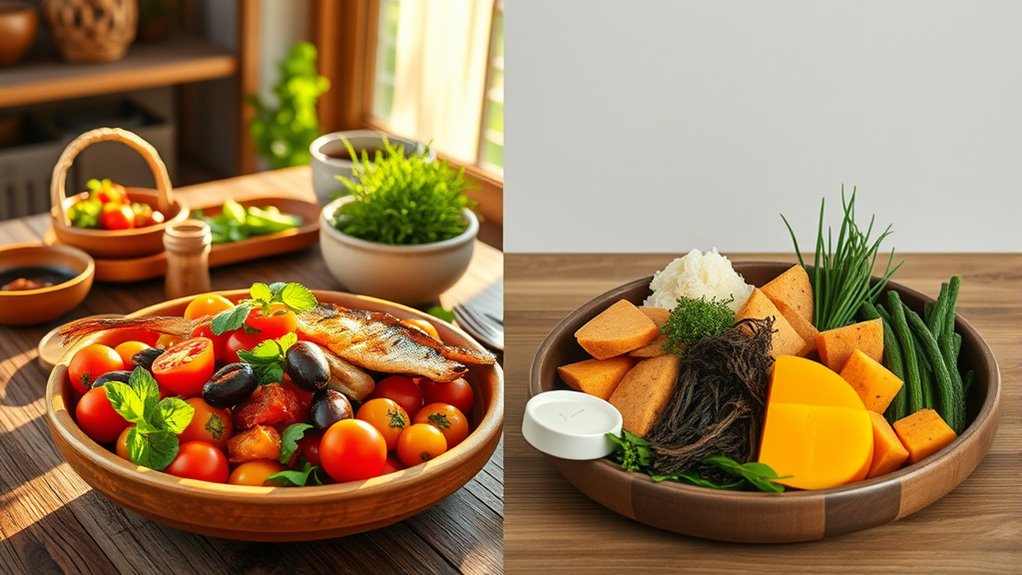Both the Okinawan and Mediterranean diets promote longevity through nutrient-dense, sustainable habits. The Okinawan diet emphasizes caloric restriction and minimally processed foods like sweet potatoes, vegetables, and fish, fostering healthy aging. The Mediterranean diet focuses on balanced, diverse foods such as olive oil, fruits, and whole grains, combined with lifestyle factors like social connection and physical activity. If you want to discover how these diets support long, healthy lives, there’s more to explore.
Key Takeaways
- Both diets emphasize nutrient-dense, minimally processed foods and long-term, sustainable eating habits for promoting longevity.
- Okinawa focuses on caloric restriction and nutrient-rich foods like sweet potatoes and tofu, while the Mediterranean diet emphasizes variety and food quality.
- Lifestyle factors such as physical activity and social connections complement dietary patterns in enhancing lifespan.
- Both diets reduce inflammation and chronic disease risk through mindful eating and healthy food choices.
- Combining principles from both diets may offer synergistic benefits for health span and aging.

Have you ever wondered why some populations live considerably longer than others? It’s a question that researchers have explored for decades, and two diets often come up in these discussions: the Mediterranean and Okinawan diets. Both are associated with extraordinary longevity, but they achieve this through different dietary patterns and lifestyle choices. When you compare these diets, you’ll notice that caloric restriction plays a significant role in the Okinawan approach, while the Mediterranean diet emphasizes a balanced, plant-rich eating pattern. These differences highlight how various strategies can contribute to a longer, healthier life.
In Okinawa, the core principle revolves around caloric restriction. The people here tend to eat fewer calories than typical Western diets, often consuming only about 80% of their full satiety. This deliberate reduction in calorie intake isn’t about deprivation but about mindful eating—focusing on nutrient-dense foods and avoiding overeating. Their dietary patterns include a high intake of sweet potatoes, vegetables, tofu, and fish, with limited consumption of rice and processed foods. The idea is to nourish the body with wholesome, minimally processed ingredients while avoiding excess calories that can accelerate aging and increase disease risk. This approach aligns with research showing that caloric restriction can promote longevity by reducing inflammation, oxidative stress, and cellular aging. Interestingly, some studies suggest that combining caloric restriction with nutrient-dense foods can further enhance health benefits.
Meanwhile, the Mediterranean diet emphasizes a balanced, diverse array of foods rooted in traditional eating habits from countries bordering the Mediterranean Sea. It features plenty of olive oil, fruits, vegetables, whole grains, nuts, and legumes, with moderate amounts of fish and poultry. Red wine and dairy are consumed in moderation, and red meat is limited. The focus here isn’t necessarily on caloric restriction but on the quality and variety of foods, which contribute to overall health and longevity. The dietary patterns promote heart health, reduce inflammation, and support metabolic well-being. The Mediterranean way of eating is approachable and sustainable, encouraging a lifestyle that integrates nutritious food choices with physical activity and social connections.
Both diets demonstrate that longevity isn’t about a single miracle food or extreme restrictions but about consistent, mindful choices that foster health over time. Whether through the disciplined caloric restriction seen in Okinawa or the balanced dietary patterns of the Mediterranean, adopting these principles can help you improve your health span. By understanding these differences, you can tailor your eating habits to fit your lifestyle while still aiming for the goal of a long, vibrant life. The key lies in making sustainable, nutrient-rich choices that support your body’s needs and reduce the risk of chronic diseases, regardless of the specific diet you follow.
Frequently Asked Questions
How Do Genetics Influence Longevity in These Diets?
Genetics play a significant role in your longevity, influencing how your body responds to different diets. Your genetic predisposition can affect nutrient absorption, metabolism, and resistance to diseases. Dietary inheritance, or the genetic traits passed down that impact your eating habits and health, also shapes your lifespan. While healthy diets like Mediterranean and Okinawan can boost longevity, your unique genetic makeup determines how effectively these diets benefit you personally.
What Role Does Physical Activity Play Alongside Diet?
Imagine your body as a finely tuned engine—diet is the fuel, but physical activity is the spark that ignites longevity. When you keep activity levels high, exercise synergy boosts your health, strengthening your heart and muscles. Without movement, even the best diet can fall flat. You play a essential role in longevity, as regular activity amplifies the benefits of healthy eating, creating a powerful partnership for a longer, healthier life.
Are There Any Common Environmental Factors Affecting Both Populations?
You might notice that both populations are influenced by common environmental factors like lower exposure to environmental pollutants, which helps protect their health. Additionally, strong social support networks play a essential role, fostering mental well-being and encouraging healthy behaviors. These shared environmental aspects contribute to their longevity, complementing their diets. Recognizing these factors highlights how environment and community support are indispensable for promoting longer, healthier lives across different cultures.
How Do Cultural Attitudes Impact Diet Adherence?
When it comes to diet adherence, cultural perceptions play a big role, and social influences can make or break your efforts. You might find that surrounding attitudes shape your food choices more than you realize—people tend to follow what’s accepted and valued in their community. It’s often said that you are the company you keep, so embracing positive cultural attitudes can motivate you to stick with healthy habits and enjoy the journey.
What Are the Economic Implications of Adopting These Diets Globally?
When considering the economic implications of adopting these diets globally, you should think about healthcare costs and food affordability. If more people follow healthful diets like the Mediterranean or Okinawan, healthcare costs might decrease due to fewer age-related diseases. However, food affordability could become a concern, especially in regions where access to fresh, nutritious ingredients is limited. Balancing these factors is vital for sustainable, worldwide adoption.
Conclusion
In your pursuit of prolonged, prosperous living, prioritize the powerful principles of these longevity diets. The Mediterranean’s marvelous mixture of monounsaturated fats and fresh fruits and vegetables, paired with Okinawa’s outstanding emphasis on plant-based, nutrient-rich foods, offers outstanding opportunities. By blending balance, beauty, and biological benefits, you can cultivate a carefree, cancer-resistant, creditable clock of longevity. Embrace these diets’ dynamic diversity and dedicate yourself to a disciplined, delicious daily dietary dance.










